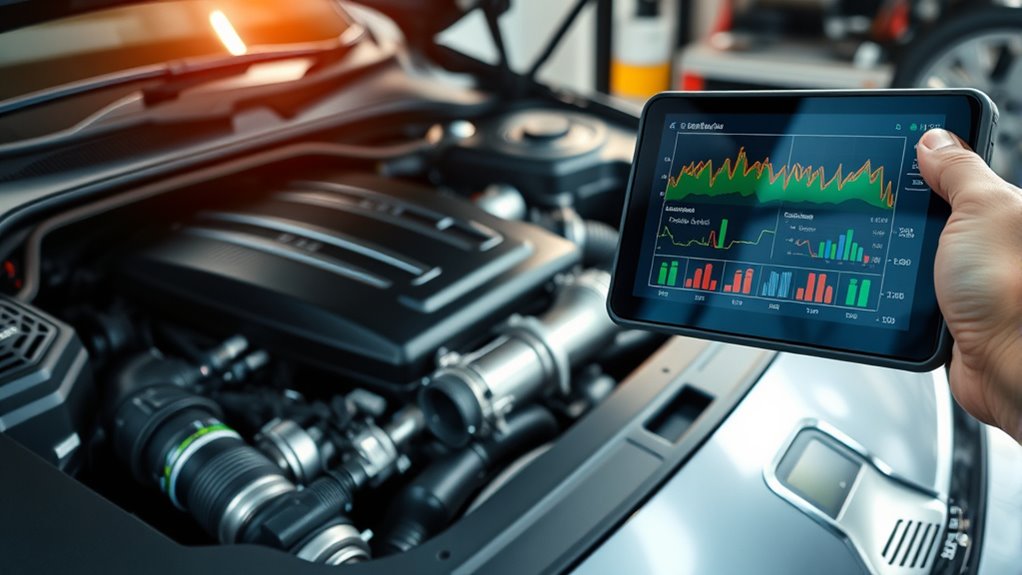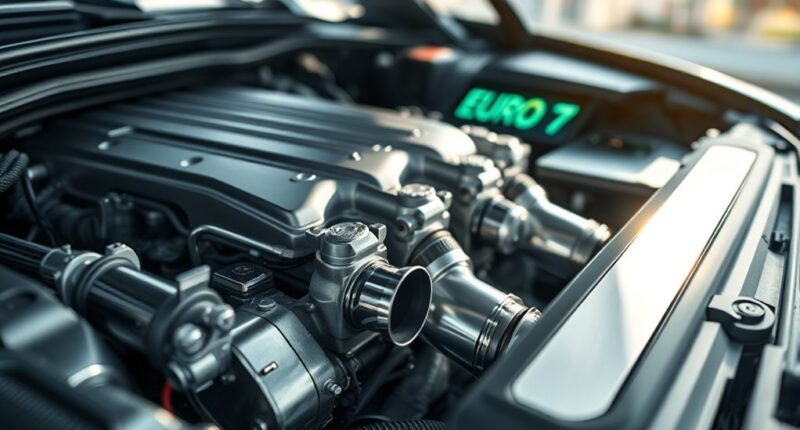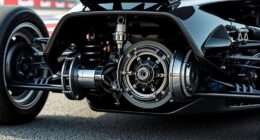Euro 7 emissions standards tighten limits on pollutants like NOx, particulate matter, and CO, directly affecting how you modify and tune your vehicle. You’ll need to guarantee aftermarket parts meet these strict regulations, often requiring certified technology and compliance testing. Ignoring these rules could lead to fines or registration issues. To stay legal and optimize your vehicle’s performance within these new limits, it’s important to understand how these standards impact tuning—more details will show you how to adapt effectively.
Key Takeaways
- Euro 7 sets stricter limits on pollutants, affecting vehicle tuning and aftermarket modifications.
- All tuning parts must meet certification standards to ensure compliance with Euro 7 regulations.
- Non-compliant modifications risk fines, registration issues, and legal penalties.
- Industry is developing cleaner exhaust systems and advanced emissions control technologies.
- Responsible tuning now requires verifying parts for emissions certification and consulting specialists.

As countries around the world tighten vehicle emissions standards to combat pollution, understanding Euro 7 emissions rules becomes essential for manufacturers, policymakers, and consumers alike. If you’re involved in vehicle tuning or modifications, these regulations directly impact what you can do when customizing cars. Euro 7 sets stricter limits on pollutants like nitrogen oxides (NOx), particulate matter, and carbon monoxide, which means aftermarket modifications must now prioritize emissions compliance to stay within legal boundaries. Ignoring these rules can lead to hefty fines or even the inability to register or sell vehicles in certain markets.
Tightening Euro 7 standards demand emissions-compliant vehicle tuning to avoid fines and registration issues.
For enthusiasts and professional tuners alike, Euro 7 introduces new challenges. Many might think that performance upgrades—like engine remapping, exhaust system modifications, or adding filters—are straightforward. But with tighter emissions limits, any change that increases pollutants could put your vehicle out of compliance. This means you need to be more mindful of your modifications, ensuring they don’t inadvertently cause your vehicle to breach emissions standards. Not all aftermarket parts are created equal; some might improve performance but could also increase emissions if not specifically designed to meet Euro 7 criteria. As a result, you’ll want to work with parts that are tested and certified for emissions compliance to avoid future legal issues.
Understanding these regulations helps you make smarter choices about aftermarket modifications. Manufacturers are now developing components that meet Euro 7 standards right out of the box, but as a consumer or tuner, you must verify that any parts you add or alter maintain compliance. This could involve checking for certified emissions labels or consulting with specialists familiar with Euro 7 requirements. Failing to do so means risking not just fines but also negatively impacting the environment, which is a shared responsibility for everyone in the automotive world.
Moreover, these regulations are pushing the industry toward innovative solutions like cleaner exhaust systems, advanced catalytic converters, and intelligent engine management systems. If you’re serious about tuning, you’ll need to stay informed on how these new technologies affect emissions. It’s no longer just about boosting horsepower; it’s about doing so responsibly. The development of new emissions-compliant parts is a key aspect of adapting to these strict standards. Complying with Euro 7 isn’t just legal necessity—it’s a way to future-proof your vehicle modifications in an increasingly eco-conscious market. By understanding the importance of emissions compliance in aftermarket modifications, you can enjoy customizing your vehicle without the risk of falling foul of these new standards, all while contributing to cleaner air and a healthier environment.
Frequently Asked Questions
How Will Euro 7 Affect Classic Car Modifications?
Euro 7 emissions regulations will make classic car modifications more challenging because stricter standards limit engine tweaks and exhaust system changes. You’ll need to guarantee your modifications meet these new emissions rules, which could involve costly upgrades or limiting certain performance enhancements. This means maintaining the originality of your classic car might become harder, and you may have to balance between preserving its classic appeal and complying with modern emissions regulations.
Are There Exemptions for Electric Vehicles Under Euro 7?
Did you know electric vehicles make up over 10% of new car sales in Europe? Under Euro 7 standards, electric vehicle exemptions are in place, meaning they won’t face the same stringent emissions regulations as combustion engines. These exemptions aim to promote EV adoption and innovation, so if you’re driving or considering an electric vehicle, you won’t have to worry about Euro 7 emissions rules affecting your ride.
What Are the Penalties for Non-Compliance With Euro 7?
If you don’t comply with Euro 7 emissions standards, you face hefty non-compliance fines and regulatory penalties. Authorities can impose substantial financial sanctions, restrict vehicle registration, or even seize non-compliant vehicles. Penalties aim to enforce adherence and promote cleaner vehicles. To avoid these consequences, make certain your vehicle meets all Euro 7 requirements, or you risk costly legal actions and damage to your reputation.
Will Euro 7 Increase the Cost of Vehicle Tuning?
Did you know that nearly 60% of car enthusiasts worry about rising costs? Euro 7 likely increases the cost of vehicle tuning since stricter emissions standards demand more advanced technology and testing. This can impact tuning affordability, making modifications pricier and more complex. As a result, you might face higher expenses, but it also pushes you to explore smarter, more innovative ways to optimize your vehicle within new regulations.
How Does Euro 7 Impact Aftermarket Emissions Control Devices?
Euro 7 introduces stricter aftermarket restrictions, making it harder for you to install emissions control devices that aren’t certified. This impacts your ability to modify vehicles, as emissions testing becomes more rigorous. You’ll need to verify any aftermarket emissions control devices meet Euro 7 standards, or risk failing inspections. Ultimately, these regulations aim to reduce emissions, but they also limit your options for aftermarket upgrades.
Conclusion
As you navigate the Euro 7 emissions rules, keep in mind that they aim to cut nitrogen oxide emissions by up to 50%. This means your tuning options might become more limited, but it also pushes manufacturers toward cleaner technologies. Notably, vehicles today produce around 50% fewer emissions than those from a decade ago—impressive progress! Staying informed helps you adapt your tuning practices responsibly while enjoying the advancements in eco-friendly automotive innovation.










